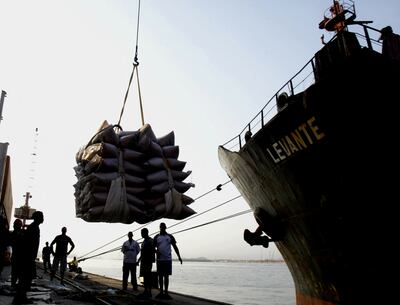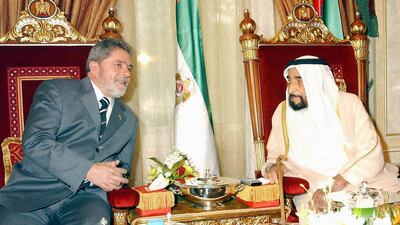Brazilian President Luiz Inacio Lula da Silva is visiting the UAE today. This is the second time President Lula is visiting the country: his first visit took place on December 2003 during his previous tenure as President of Brazil. Twenty years later, upon his return to the Emirates, he will find a modern, thriving and prosperous country, increasingly active in addressing regional and global challenges. President Lula will also be happy to see that the bilateral ties between Brazil and the UAE are now at their best and that his visit will contribute to further advance this successful partnership.
The strength of our bond is founded in our will to transform the present and in our vision of the future. Both Brazil and the UAE have young, industrious and creative populations, territories rich in natural resources, complementary agendas in many fields and a common concern about issues that demand urgent attention, such as sustainable environmental practices and more effective international governance, among others. The basis of our decision to build a strategic partnership between Brazil and the UAE lies in a relationship organised around shared values and ideas, oriented to the future and cemented in mutual trust and confidence.
Over the past 20 years, the UAE has become one of the main partners of Brazil in the Middle East. Few countries have managed to achieve so much diplomatic density with Brazil in such a short period. In addition to the impressive economic figures, our agenda has expanded to areas that range from culture to artificial intelligence, from space co-operation to modernisation of governmental practices, from sports to defence.

This history of success would not be the same without the decisive and interested engagement of our peoples in this project: around 10,000 Brazilians now live in the Emirates; Dubai and Abu Dhabi are today important tourist destinations for many Brazilians, who are serviced by daily flights connecting Brazil and the UAE; Brazilian Jiu-Jitsu has been resolutely embraced by Emirati people and has become quite popular in the country; Emirati investments have blossomed in many parts of the Brazilian territory and, on the other hand, over 30 Brazilian companies have set up branch offices in the Emirates.
The Emirates are today the main destination of Brazilian products among Arab countries. Our trade in 2022 reached $5.7 billion, an increase of 74 per cent in relation to 2021. We are proud to see that Brazil has become an important and reliable food supplier to the Emirates, strengthening the country's food security and stability. It is also encouraging to see the confidence Emirati investors have in the Brazilian market: the UAE is now the biggest Middle-Eastern investor in Brazil, with more than $10 billion invested in fields as diverse as infrastructure, mining, real state, entertainment and education.
Adia and Mubadala have played a decisive role not only in forming business ties and showing confidence in Brazilian economy but also in identifying projects with relevant social impact.
Another area of successful co-operation is climate action. Both countries understand the importance of fighting climate change and have taken significant steps towards achieving their respective Nationally Determined Contributions. Brazil is home to the world's largest rainforest, the Amazon, which plays a crucial role in mitigating the effects of climate change. Brazil also has one of the cleanest energy matrices in the world. Almost 85 per cent of electricity and 50 per cent of the total energy demand in Brazil is generated from renewable sources. Meanwhile, the UAE has made significant investments in renewable energy, with ambitious goals to increase the use of clean energy in the country.
In this regard, Brazil is committed to supporting the UAE as the hosts of the 28th Conference of the Parties to the United Nations Framework Convention on Climate Change (Cop28) this year. We are confident that the UAE will host a successful conference and contribute significantly to the global climate action agenda. As part of our commitment to advancing that agenda, Brazil is expected to bid to host Cop30, and we will be working closely with our Emirati partners in this regard. We believe that Brazil has much to offer as a host country and that our bid will provide a valuable opportunity to showcase our commitment to climate action and sustainable development.
Brazil and the UAE have also shown an outstanding capacity for co-ordination on international issues in multilateral fora, especially in the UN Security Council where both countries coincide as non-permanent members, for the biennium 2022-2023. Both Brazil and the UAE have been resolute advocates of international co-operation as a tool to promote security and lasting peace. For this reason, I am confident that the upcoming Emirati presidency of the Council in June 2023 and the Brazilian presidency next October 2023 will present unique occasions for our countries to keep strengthening the dialogue on key global security issues.
The visit of President Lula to Abu Dhabi will not only be an opportunity to advance agreements and declarations that will energise our bilateral relations in different areas. His visit will also convey to President Sheikh Mohammed and to the Emirati people a clear message of confidence in our relations and in our capacity to work together for the prosperity and well-being of Brazilians and Emiratis.


